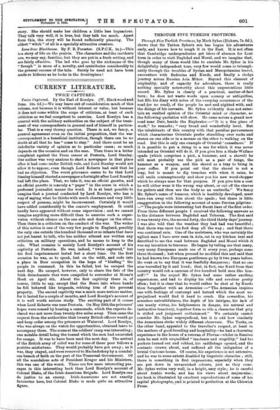THROUGH FIVE TURKISH PROVINCES.
Through Five Turkish Provinces, by Mark Sykes (Bickers, 7s. ed.), shows that Sir Tatton Sykes's son has begun his adventures early, and knows how to rough it in the East. It is not often that Cambridge undergraduates get leave of absence for Lent term in order to visit Baghdad and Mosul, and we imagine that, though many of them would like to emulate Mr. Sykes in his delightfully independent tour, very few would come so triumph- antly through the troubles of Syrian and Mesopotamian travel, encounters with Bedouins and Kurds, and finally a sledge journey across Russian Asia Minor. Beyond this element of originality, and of capacity for adventure, there is really nothing specially noteworthy about this unpretentious little record. Mr. Sykes is clearly of a practical, matter-of-fact turn ; he does not waste words upon scenery or antiquities, but fills his diary with notes of the everyday occurrences of the road (or no road), of the people he met and flighted with, and the doings of his servants. Mr. Sykes evidently does not enter- tain an exalted opinion of the Oriental mind or character, as the following quotation will show. He came across a grand new road near Deir, beside the Euphrates :—" It is a fine piece of work," he remarks; "very broad and wonderfully level. But the inhabitants of this country with that peculiar perverseness which characterises Orientals prefer stumbling over rocks and stones on one side or in a morass on the other to walking on the road. But this is only one example of Oriental cussedness.' If it is possible to put a thing to a use for which it was never intended an Oriental will do it. If you give him a Slade-Wallace spade (which comprises a pick, a hammer, and a shovel) he will most probably use the pick as a pair of tongs, the hammer as a weapon, and the shovel as a tray to bring in your coffee. If you point out that the shovel is not a tray, but is meant to dig trenches with when it rains, he will smile contemptuously and show you his new wood-chopper which he always uses for that purpose. If you give him a coat he will either wear it the wrong way about, or cut off the sleeves for gaiters and then Use the body as an umbrella." We fancy Mr. Sykes's sense of humour, which is healthily developed, must have run away with him about the spade ; but there is little exaggeration in the following account of some Persian pilgrims : —" The people were interesting but fluent liars of the first order. From three different people I received the following answers as to the distance between Baghdad and Teheran. The first said it was twenty-two, the second forty, the third thirty days' journey. I was also told that the weather they had had was beautiful ; that there was snow ten feet deep all the way ; and that there was continual rain. One of the muleteers, who was certainly the ugliest man I have ever seen in Asia, sat in my kitchen tent and described to me the road between Baghdad and Mosul which it was my intention to traverse. He began by telling me that many, very many Europeans made use of it every year, perhaps some three thousand ; but when pressed he modified this and said that he had known two European gentlemen go by it two years before. He went on to say that it was fearfully dangerous ; that no one ever travelled by it and lived ; that, in fact, one Kurd from that country would rob a caravan of five hundred bold men like him- self !" In the sequel Mr. Sykes had some rather exciting experiences, and had to display his rifle and revolver pretty often ; but it is clear that he would rather be shot at by Kurds than foregather with an Armenian :—" The Armenian inspires one with feelings of contempt and hatred which the most un- prejudiced would find it hard to crush. His cowardice, his senseless untruthfulness, the depth of his intrigue, his lack of one manly virtue, his helplessness in danger, his natural and instinctive treachery, together form so vile a character that pity is stifled and judgment outbalanced." We certainly cannot consider Mr. Sykes unprejudiced, but it is odd how similarly the Armenians strike widely different observers. The Turks, on the other hand, appealed to the traveller's respect, at least in the matters of good-breeding and hospitality—he had a charming experience in the house of a veteran of Plevna—whilst in Russian Asia he met with unqualified "insolence and stupidity," had his pockets turned out and robbed, his saddlebags opened, and the contents strewn about, and suffered all the indignities of a brutal Customs-house. Of course, his experience is not extensive, and he was to some extent disabled by linguistic obstacles ; still, there is something in first impressions, especially when they are put down in unvarnished colours, just as they come. Mr. Sykes writes very well, in a bright, easy style ; he is careful about Arabic words, and has his views about majuscules; his book is illustrated by excellent reproductions of some of his capital photographs, and is printed to perfection at the Chiswick Press.






















































 Previous page
Previous page